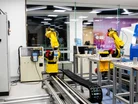Accenture & NVIDIA: how Agentic AI will Shape Manufacturing

Accenture and NVIDIA have expanded their partnership to fuel and scale successful industrial and enterprise adoptions of AI.
The Accenture NVIDIA Business Group will be supported by more than 30,000 professionals receiving training globally to help clients reinvent processes and scale enterprise AI adoption.
With generative AI (Gen AI) demand driving US$3bn in Accenture bookings in its recently-closed fiscal year, the new group will help clients embrace agentic AI using Accenture’s AI Refinery.
Agentic AI refers to AI that isn't prompt-dependant – it can act on its own and anticipate users needs.
Considered by many to be the next evolution of Gen AI, agentic AI has a wealth of industrial uses and is set to transform manufacturing.
"AI will supercharge enterprises to scale innovation at greater speed,” says Jensen Huang, Founder and CEO at NVIDIA.
“NVIDIA’s platform, Accenture’s AI Refinery and our combined expertise will help businesses and nations accelerate this transformation to drive unprecedented productivity and growth.”
Accenture’s AI Refinery utilises the full NVIDIA AI stack, which includes NVIDIA AI Foundry, NVIDIA AI Enterprise and NVIDIA Omniverse, to advance areas such as process reinvention, AI-powered simulation and sovereign AI.
It will be available on all public and private cloud platforms and will integrate seamlessly with other Accenture Business Groups to accelerate AI across the SaaS and Cloud AI ecosystem.
“We are breaking significant new ground with our partnership with NVIDIA and enabling our clients to be at the forefront of using generative AI as a catalyst for reinvention,” says Julie Sweet, Chair and CEO, Accenture.
“Accenture AI Refinery will create opportunities for companies to reimagine their processes and operations, discover new ways of working, and scale AI solutions across the enterprise to help drive continuous change and create value.”
Fuelling the frontier of agentic AI
Accenture and NVIDIA are already helping clients adopt and scale agentic AI systems. One of their clients is Indosat Group, which announced the first sovereign AI in Indonesia.
It enables companies to securely deploy AI while ensuring regulatory compliance and data governance.
Alongside using agentic AI at Eclipse Automation, Accenture’s marketing function is augmenting the AI Refinery platform with autonomous agents to run and create smarter, quicker and better campaigns. They estimate this will result in a 25-35% reduction in manual steps, 6% cost savings and a 25-55% increase in speed to market.
Accenture is also introducing a network of hubs that feature deep engineering skills and agentic AI systems to its Center for Advanced AI.
These AI-refinery hubs, which currently exist in California, US and Bangalore, India, will help select, fine-tune, inference and successfully scale foundational AI models used to transform large scale operations – including within manufacturing.
How agentic AI will impact manufacturing
Agentic AI is set to have a profound impact on the manufacturing sector.
As part of their expanded partnership, Accenture is debuting a new NVIDIA NIM agent Blueprint for virtual facility robot fleet simulation.
This blueprint integrates NVIDIA Omniverse, Isaac and Metropolis software, enabling manufacturers to build autonomous, robot-operated and software-defined factories and facilities.
It represents a huge step forward for the future of manufacturing automation, which has been one of the defining features of the sector's embrace of industry 4.0.
"AI-driven simulations are transforming the landscape of manufacturing and product development," says Prasad Satyavolu, Industry X - Manufacturing Lead at Accenture.
"Leveraging NVIDIA's technologies alongside Accenture's deep experience in manufacturing, we're at the forefront of virtualisation and automating production in unprecedented ways."
Agentic AI has the potential to optimise manufacturing workflows, improve predictive maintenance and make industrial robots more effective, safe and trustworthy.
It will be a huge sustainability driver, reducing energy consumption and waste through continual optimisation.
Agentic AI is also set to have a similar impact on quality control and inspection, automatically adjusting parameters to improve quality and self learning from previous errors.
The continuous learning and self-optimisation of which Agentic AI systems are capable will not only improve manufacturers handling of processes, but also their responses to broader market and regulatory changes.
This is what truly sets it apart from other forms of AI.
Some jobs will be displaced by the technology, but they will, in turn, be replaced by new roles, opportunities and positions.
Manufacturers need to invest in upskilling and reskilling their staff to safeguard their future and ensure successful adaption to this change.
By optimising production processes, agentic AI can help reduce energy consumption and waste, contributing to more sustainable manufacturing.
Despite the challenges of Agentic AI, which involve integration with legacy systems and cybersecurity risks, among others, it's capacity for positive change outweighs the negatives.
Accenture will use these new capabilities at Eclipse Automation, an Accenture-owned manufacturing automation company, to deliver as much as 50% faster designs and 30% reduction in cycle time on behalf of its clients.
******
Make sure you check out the latest edition of Manufacturing Digital and also sign up to our global conference series - Procurement & Supply Chain 2024 & Sustainability LIVE 2024
Manufacturing Digital is a BizClik brand.


